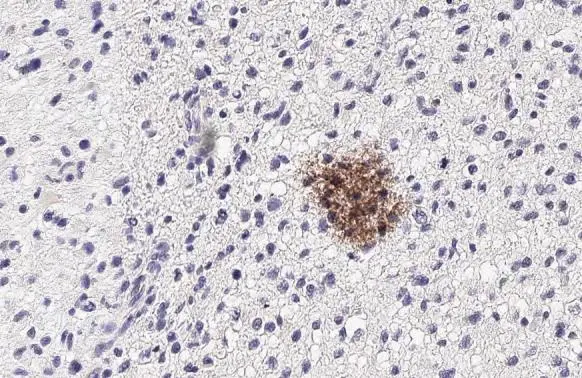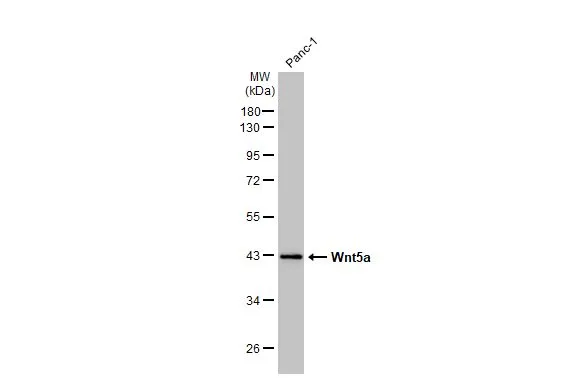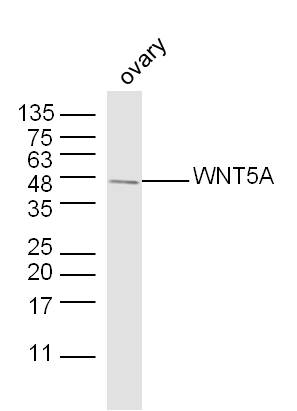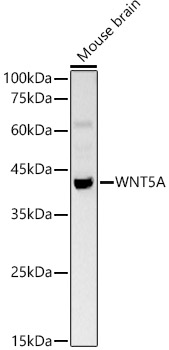![WB analysis of HEK293 (1) and WNT5A-hIgGFc transfected HEK293 cell lysate (2) using GTX83266 WNT5A antibody [3D10]. WB analysis of HEK293 (1) and WNT5A-hIgGFc transfected HEK293 cell lysate (2) using GTX83266 WNT5A antibody [3D10].](https://www.genetex.com/upload/website/prouct_img/normal/GTX83266/GTX83266_20170912_WB_w_23061322_617.webp)
WB analysis of HEK293 (1) and WNT5A-hIgGFc transfected HEK293 cell lysate (2) using GTX83266 WNT5A antibody [3D10].
Wnt5a antibody [3D10]
GTX83266
ApplicationsWestern Blot, ELISA, ImmunoHistoChemistry, ImmunoHistoChemistry Paraffin
Product group Antibodies
ReactivityHuman
TargetWNT5A
Overview
- SupplierGeneTex
- Product NameWnt5a antibody [3D10]
- Delivery Days Customer9
- Application Supplier NoteWB: 1/500 - 1/2000. IHC-P: 1/200 - 1/1000. ELISA: 1/10000. *Optimal dilutions/concentrations should be determined by the researcher.Not tested in other applications.
- ApplicationsWestern Blot, ELISA, ImmunoHistoChemistry, ImmunoHistoChemistry Paraffin
- CertificationResearch Use Only
- ClonalityMonoclonal
- Clone ID3D10
- ConjugateUnconjugated
- Gene ID7474
- Target nameWNT5A
- Target descriptionWnt family member 5A
- Target synonymshWNT5A, protein Wnt-5a, WNT-5A protein, epididymis secretory sperm binding protein, wingless-type MMTV integration site family, member 5A
- HostMouse
- IsotypeIgG1
- Protein IDP41221
- Protein NameProtein Wnt-5a
- Scientific DescriptionThe WNT gene family consists of structurally related genes which encode secreted signaling proteins. These proteins have been implicated in oncogenesis and in several developmental processes, including regulation of cell fate and patterning during embryogenesis. This gene encodes a member of the WNT family that signals through both the canonical and non-canonical WNT pathways. This protein is a ligand for the seven transmembrane receptor frizzled-5 and the tyrosine kinase orphan receptor 2. This protein plays an essential role in regulating developmental pathways during embryogenesis. This protein may also play a role in oncogenesis. Mutations in this gene are the cause of autosomal dominant Robinow syndrome. Alternate splicing results in multiple transcript variants. [provided by RefSeq, Jan 2012]
- ReactivityHuman
- Storage Instruction-20°C or -80°C,2°C to 8°C
- UNSPSC12352203

![IHC-P analysis of human lung cancer (A), thyroid cancer (B), lymph node (C) and brain (D) using GTX83266 WNT5A antibody [3D10]. IHC-P analysis of human lung cancer (A), thyroid cancer (B), lymph node (C) and brain (D) using GTX83266 WNT5A antibody [3D10].](https://www.genetex.com/upload/website/prouct_img/normal/GTX83266/GTX83266_20170912_IHC-P_w_23061322_208.webp)






![ICC/IF analysis of PC12 cells using GTX83127 WNT5A antibody [6F2]. Green : WNT5A Blue: DRAQ5 fluorescent DNA dye](https://www.genetex.com/upload/website/prouct_img/normal/GTX83127/GTX83127_20170912_ICCIF_w_23061322_555.webp)